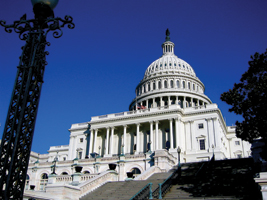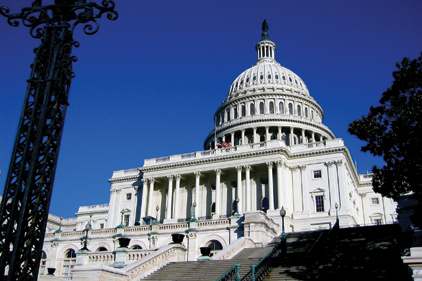
|
| The bipartisan Shaheen-Portman energy efficiency bill has been set aside indefinitely after Senate Republicans and Democrats were unable to reach an agreement on the bill’s amendments. (Photo courtesy of Elliott Pesut) |
And with several time-sensitive funding bills now taking center stage, the future of Shaheen-Portman is uncertain as Congress focuses its attention elsewhere.
Energy-Saving Legislation
The Shaheen-Portman bill, also known as S 1392, The Energy Savings and Industrial Competitiveness Act of 2013, was first introduced by U.S. Sens. Jeanne Shaheen, D-N.H., and Rob Portman, R-Ohio, in 2011 as S 1000. The bill was introduced in the 113th Congress as S 761 in April, and was again modified in July and reintroduced as S 1392, with Senate leadership vowing to make the bill a top priority upon returning from its August recess.
The bill, which is the first piece of energy-efficiency legislation to make it to the Senate floor since 2007, has received widespread support from Republicans, Democrats, manufacturers, energy-efficiency advocates, and the U.S. Chamber of Commerce, among others. The legislation has a $250 million price tag and provides training for workers in energy-efficient building technologies; strengthens energy-saving model building codes; and promotes energy savings in residential buildings, federal agencies, and industrial facilities.
A House version of the bill was introduced this April by U.S. Reps. David McKinley, R-W.Va., and Peter Welch, D-Vt.; the bill has been referred to four different standing committees while the Senate debates the legislation.
Amendment Roadblock
While the legislation itself is not controversial, plans to debate the bill in the Senate hit a roadblock when Sen. David Vitter, R-La., demanded a vote on an unrelated amendment that would reduce or eliminate health insurance subsidies for lawmakers and require them to participate in the health exchanges created by the Affordable Care Act of 2010. Vitter’s demand for a vote on his Obamacare amendment spurred others, and the bill was ultimately set aside on Sept. 19 so the Senate could work on other issues.
Charlie McCrudden, vice president of government relations for Air Conditioning Contractors of America (ACCA), said the widely supported and uncontroversial Shaheen-Portman bill is being used as a vehicle for lawmakers who wish to pass their own more controversial measures, which may or may not be related to energy efficiency.
“The Shaheen-Portman bill is bipartisan and not controversial, but it’s the first energy bill that’s made the Senate floor since 2007,” McCrudden said. “It’s the first chance to talk about energy policy in a while, and it’s also the first chance to talk about things that have been waiting in the wings.”
“When you haven’t had an energy-related piece of legislation in years, everyone is trying to attach their item or their wish list to it, including some controversial or unrelated things,” agreed Jon Melchi, director of government affairs for Heating, Air-conditioning, Refrigeration Distributors International (HARDI). “The way that the Senate voting docket has been controlled, they’re taking every opportunity to tag unrelated legislation onto bills.”
It’s nothing new in the Senate, Melchi added, but for now, the inability to reach an agreement to limit the amendments means Shaheen-Portman is on the back burner. Meanwhile, Congress has focused its attention on more pressing financial issues, including funding the federal government beyond Sept. 30.
“The holdup on this legislation has very little to do with the bill itself and everything to do with the politics surrounding Washington D.C. at this moment,” Melchi said.
Industry Disappointment
With forward progress on the bill stopped for now, many in the HVACR industry are voicing disappointment while still hanging onto hope that the legislation will be revived after Congress handles its fiscal issues.
Guido Zucconi, assistant vice president of congressional affairs for the Air-Conditioning, Heating, and Refrigeration Institute (AHRI), said AHRI is “disappointed that the Shaheen-Portman energy-efficiency bill has stalled on takeoff,” and hopes the Senate recognizes how important the bill is.
“The broad and bipartisan coalition built around the bill shows the urgent need and support for energy legislation,” Zucconi said. “The Senate is an austere and deliberative legislative body, and we hope they continue that century-old tradition to find a solution to the objections and procedural holds placed on S 1392.
“Manufacturers and AHRI alike sincerely hope and believe that, following the budget negotiations, the Senate will get back to energy efficiency discussions and find a way forward.”
Kateri Callahan, president of the Alliance to Save Energy, said that while the delay is disappointing, the fight isn’t over yet.
“Passage of this common-sense, cost-effective legislation with broad political support and stakeholder backing should be a no-brainer as it would save consumers and businesses money, lower levels of pollution, and increase U.S. economic competitiveness,” she said.
Callahan also lauded the bill’s sponsors and supporters and vowed “to continue working with stakeholders to help these energy-efficiency champions advance Shaheen-Portman through the Senate, and send it to the president’s desk to be signed into law.”
HARDI is taking a wait-and-see approach, especially in regard to the proposed amendments that could be attached to the bill.
“We have supported certain amendment efforts to make energy-efficiency programs more accessible for public schools and certain other amendments that might be added,” Melchi said. “For us, as written, there’s no problem with it. It’s a question of what amendments get attached.” He added, “We applaud the effort of both senators to engage stakeholders and to craft a piece of legislation that really appears to have little opposition, which is a difficult hurdle to clear in this town.”
What’s Next?
With Congress focusing on financial issues, it is not known when, or if, the Senate will take up the bill again this year. But if Congress can resolve its financial issues, and if nothing else demands Congress’s immediate attention, the Senate may be able to resume discussion on the bill in the coming weeks or months.
“There is a need for Congress to address energy policy,” McCrudden said. “There are a lot of good amendments being offered and good policy ideas in the Shaheen-Portman bill, and they just need a vehicle. The Shaheen-Portman bill is the most appropriate vehicle right now.”
Even so, McCrudden said Senate Majority Leader Harry Reid may decide not to bring the bill back for debate any time soon if he anticipates further deadlock. “If he doesn’t want to fool around with all these amendments to the bill that they can’t come to an agreement on, then they’ll move onto other things,” he said.
If it does not get a vote, McCrudden said it is possible some provisions and amendments from the Shaheen-Portman bill may be attached to upcoming bills, possibly including the continuing resolution (CR) that Congress must pass in order to continue funding the federal government.
“Or it could be tax extenders,” McCrudden added. “There are 55 tax provisions, including 25C, that expire at the end of the year, so some of the provisions in Shaheen-Portman could be inserted into that bill.”
But Melchi is more optimistic that the bill will get a vote in the Senate before the end of the 113th Congress. “Just because it doesn’t happen today or tomorrow doesn’t mean the bill is dead,” he said. “We have to remember that the 113th Congress is going to be in session until the end of next year. We obviously have to deal with a continuing resolution and the debt ceiling, and that will likely take us into November, which then they’re talking tax reform and other end-of-the-year items.
“So while the legislative calendar is crowded, there could be an opportunity for it following what a lot of people think is going to be a very hyper-partisan time of year,” Melchi continued. “It’s tough to see it happening in the immediate future, but I wouldn’t rule it out before the end of this Congress.”
To read and track the progress of S 1392, visit http://bit.ly/19DY089.
Publication date: 10/7/2013
Want more HVAC industry news and information? Join The NEWS on Facebook, Twitter, and LinkedIn today!



Report Abusive Comment